Related Research Articles

The economy of Nicaragua is focused primarily on the agricultural sector. Nicaragua itself is the least developed country in Central America, and the second least developed in the Americas by nominal GDP, behind only Haiti. In recent years, under the administrations of Daniel Ortega, the Nicaraguan economy has expanded somewhat, following the Great Recession, when the country's economy actually contracted by 1.5%, due to decreased export demand in the American and Central American markets, lower commodity prices for key agricultural exports, and low remittance growth. The economy saw 4.5% growth in 2010 thanks to a recovery in export demand and growth in its tourism industry. Nicaragua's economy continues to post growth, with preliminary indicators showing the Nicaraguan economy growing an additional 5% in 2011. Consumer Price inflation have also curtailed since 2008, when Nicaragua's inflation rate hovered at 19.82%. In 2009 and 2010, the country posted lower inflation rates, 3.68% and 5.45%, respectively. Remittances are a major source of income, equivalent to 15% of the country's GDP, which originate primarily from Costa Rica, the United States, and European Union member states. Approximately one million Nicaraguans contribute to the remittance sector of the economy.

Cotton is a soft, fluffy staple fiber that grows in a boll, or protective case, around the seeds of the cotton plants of the genus Gossypium in the mallow family Malvaceae. The fiber is almost pure cellulose, and can contain minor percentages of waxes, fats, pectins, and water. Under natural conditions, the cotton bolls will increase the dispersal of the seeds.
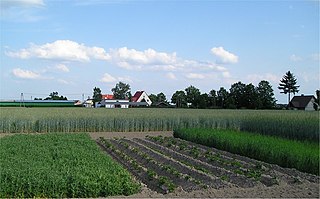
Crop rotation is the practice of growing a series of different types of crops in the same area across a sequence of growing seasons. This practice reduces the reliance of crops on one set of nutrients, pest and weed pressure, along with the probability of developing resistant pests and weeds.

In North America, a corn tortilla or just tortilla is a type of thin, unleavened flatbread, made from hominy, that is the whole kernels of maize treated with alkali to improve their nutrition in a process called nixtamalization. A simple dough made of ground hominy, salt and water is then formed into flat discs and cooked on a very hot surface, generally an iron griddle called a comal.

A sweatshop or sweat factory is a crowded workplace with very poor or illegal working conditions, including little to no breaks, inadequate work space, insufficient lighting and ventilation, or uncomfortably or dangerously high or low temperatures. The work may be difficult, tiresome, dangerous, climatically challenging, or underpaid. Employees in sweatshops may work long hours with unfair wages, regardless of laws mandating overtime pay or a minimum wage; child labor laws may also be violated. Women make up 85 to 90% of sweatshop workers and may be forced by employers to take birth control and routine pregnancy tests to avoid supporting maternity leave or providing health benefits.
The high-level equilibrium trap is a concept developed by environmental historian Mark Elvin to explain why China never underwent an indigenous Industrial Revolution despite its wealth, stability, and high level of scientific achievement. Essentially, he claims that the Chinese pre-industrial economy had reached an equilibrium point where supply and demand were well-balanced. Late imperial production methods and trade networks were so efficient and labor was so cheap that investment in capital to improve efficiency would not be profitable.

Agriculture is a major industry in the United States, which is a net exporter of food. As of the 2017 census of agriculture, there were 2.04 million farms, covering an area of 900 million acres (1,400,000 sq mi), an average of 441 acres per farm.
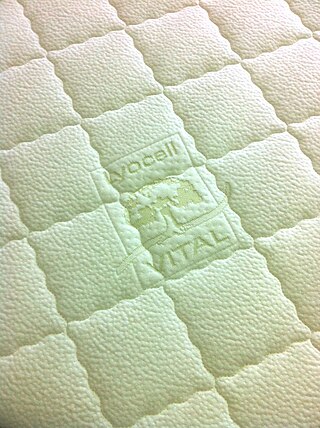
Lyocell is a semi-synthetic fiber used to make textiles for clothing and other purposes. It is a form of regenerated cellulose made by dissolving pulp and dry jet-wet spinning. Unlike rayon made by the more common viscose processes, Lyocell production does not use carbon disulfide, which is toxic to workers and the environment. Lyocell was originally trademarked as Tencel in 1982.
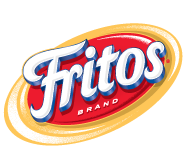
Fritos is an American brand of corn chips that was created in 1932 by Charles Elmer Doolin and has been produced since 1961 by the Frito-Lay division of PepsiCo. Fritos are made by deep-frying extruded whole cornmeal, unlike the similar tortilla chips, which are made from cornmeal and use the nixtamalization process. It is one of two brands representing Frito-Lay along with Lay's. The Fritos brand also appears on a line of cheese sauces and bean dip.

The textile industry is primarily concerned with the design, production and distribution of textiles: yarn, cloth and clothing.
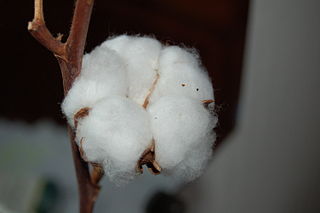
Cottonseed is the seed of the cotton plant.

Organic cotton is generally defined as cotton that is grown organically in subtropical countries such as India, Turkey, China, and parts of the USA from non-genetically modified plants, and without the use of any synthetic agricultural chemicals such as fertilizers or pesticides aside from the ones allowed by the certified organic labeling. Its production is supposed to promote and enhance biodiversity and biological cycles. In the United States, cotton plantations must also meet the requirements enforced by the National Organic Program (NOP) from the USDA in order to be considered organic. This institution determines the allowed practices for pest control, growing, fertilizing, and handling of organic crops.
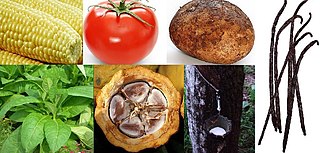
A crop is a plant that can be grown and harvested extensively for profit or subsistence. In other words, a crop is a plant or plant product that is grown for a specific purpose such as food, fibre, or fuel.
Intensive crop farming is a modern industrialized form of crop farming. Intensive crop farming's methods include innovation in agricultural machinery, farming methods, genetic engineering technology, techniques for achieving economies of scale in production, the creation of new markets for consumption, patent protection of genetic information, and global trade. These methods are widespread in developed nations.

Sustainable fashion is a term describing efforts within the fashion industry to reduce its environmental impacts, protect workers producing garments and uphold animal welfare. Sustainability in fashion encompasses a wide range of factors, including cutting CO2 emissions, addressing overproduction, reducing pollution and waste, supporting biodiversity and ensuring that garment workers are paid a fair wage and have safe working conditions.
Uganda's favorable soil conditions and climate have contributed to the country's agricultural success. Most areas of Uganda have usually received plenty of rain. In some years, small areas of the southeast and southwest have averaged more than 150 millimeters per month. In the north, there is often a short dry season in December and January. Temperatures vary only a few degrees above or below 20 °C but are moderated by differences in altitude.
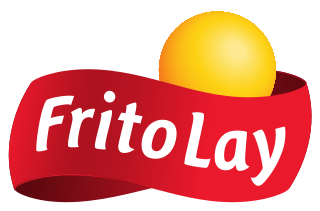
Frito-Lay, Inc. is an American subsidiary of PepsiCo that manufactures, markets, and sells corn chips, potato chips, and other snack foods. The primary snack food brands produced under the Frito-Lay name include Fritos corn chips, Cheetos cheese-flavored snacks, Doritos and Tostitos tortilla chips, Lay's and Ruffles potato chips, Rold Gold pretzels, and Walkers potato crisps. Each brand generated annual worldwide sales over $1 billion in 2009.
The textile industry in India, traditionally after agriculture, is the only industry in the country that has generated large-scale employment for both skilled and unskilled labour. The textile industry continues to be the second-largest employment generating sector in India. It offers direct employment to over 35 million people in the country. India is the world's second largest exporter of textiles and clothing, and in the fiscal year 2022, the exports stood at US$44.4 billion. According to the Ministry of Textiles, the share of textiles in total exports during April–July 2010 was 11.04%. During 2009–2010, the Indian textile industry was pegged at US$55 billion, 64% of which services domestic demand. In 2010, there were 2,500 textile weaving factories and 4,135 textile finishing factories in all of India. According to AT Kearney’s ‘Retail Apparel Index’, India was ranked as the fourth most promising market for apparel retailers in 2009.

Farming systems in India are strategically utilized, according to the locations where they are most suitable. The farming systems that significantly contribute to the agriculture of India are subsistence farming, organic farming, industrial farming. Regions throughout India differ in types of farming they use; some are based on horticulture, ley farming, agroforestry, and many more. Due to India's geographical location, certain parts experience different climates, thus affecting each region's agricultural productivity differently. India is very dependent on its monsoon cycle for large crop yields. India's agriculture has an extensive background which goes back to at least 9 thousand years. In India, in the alluvial plains of the Indus River in Pakistan, the old cities of Mohenjo-Daro and Harappa experienced an apparent establishment of an organized farming urban culture. That society, known as the Harappan or Indus civilization, flourished until shortly after 4000 BP; it was much more comprehensive than those of Egypt or Babylonia and appeared earlier than analogous societies in northern China. Currently, the country holds the second position in agricultural production in the world. In 2007, agriculture and other industries made up more than 16% of India's GDP. Despite the steady decline in agriculture's contribution to the country's GDP, agriculture is the biggest industry in the country and plays a key role in the socio-economic growth of the country. India is the second-largest producer of wheat, rice, cotton, sugarcane, silk, groundnuts, and dozens more. It is also the second biggest harvester of vegetables and fruit, representing 8.6% and 10.9% of overall production, respectively. The major fruits produced by India are mangoes, papayas, sapota, and bananas. India also has the biggest number of livestock in the world, holding 281 million. In 2008, the country housed the second largest number of cattle in the world with 175 million.

Clothing industry or garment industry summarizes the types of trade and industry along the production and value chain of clothing and garments, starting with the textile industry, embellishment using embroidery, via the fashion industry to apparel retailers up to trade with second-hand clothes and textile recycling. The producing sectors build upon a wealth of clothing technology some of which, like the loom, the cotton gin, and the sewing machine heralded industrialization not only of the previous textile manufacturing practices. Clothing industries are also known as allied industries, fashion industries, garment industries, or soft goods industries.
References
- ↑ Guide to Ending Sweatshops. Co-Op America. http://www.coopamerica.org/PDF/GuideSweatshops.pdf Archived 2009-04-19 at the Wayback Machine
- ↑ Center for Development in South America. http://www.jhc-cdca.org/
- ↑ Sweat Free Communities (2009). http://www.sweatfree.org/shoppingguide.
- ↑ Janet Miller. Executive Profile: Bena Burda President, Maggie's Organics, Ypsilanti (2009). MLive. http://www.mlive.com/business/ann-arbor/index.ssf/2009/05/executive_profile_bena_burda_p.html
- ↑ Oliver, Hilary. Nature Foods Merchandiser